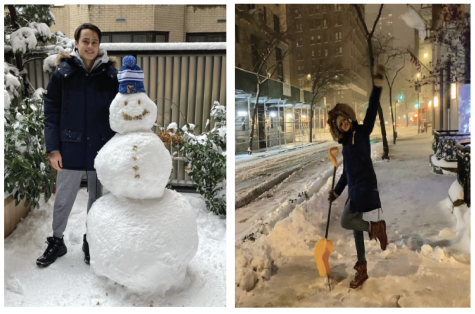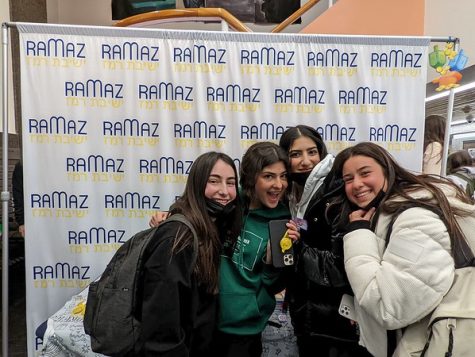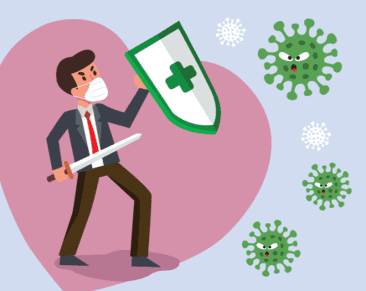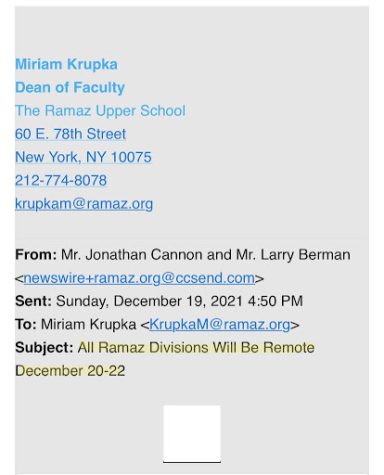Camps and Summer Programs vs. Covid-19: A Look Into Protocols and Precautions
As the 2020-2021 school year concluded, Ramaz students departed for their respective summer adventures. Some students chose to return to their beloved sleep-away camps, and others embarked on trips nationally and internationally. Other students partook in in-person pre-college programs or had the opportunity to intern. Both the programs and their respective participants aimed to limit the spread of Covid-19 by establishing and adhering to the appropriate precautions and protocols.
Upon return for her sixth year at Camp Yavneh, Emily Schnipper ‘23 received the Pfizer vaccine as her camp strongly urged all those eligible to do so. “85-90 percent of those eligible at camp received the vaccine.” The camp was considered a “bubble,” and campers were required to receive a negative Covid test before arrival. Campers were tested again on the first day of camp and the fifth. Until the camp was guaranteed to be Covid-free, campers were required to wear masks when in contact with people in other bunks. After the camp was Covid-free, campers were required to wear masks if they were unvaccinated and indoors, around unvaccinated younger campers, and if they were singing. “I thought Yavneh’s policies were appropriate and efficient, specifically the repeated testing. Comparing Ramaz’s policies to those of Yavneh would be like comparing apples to oranges because, at camp, we were contained. However, school policies were riskier because once the school-day was over, students could choose to take off their masks and break social-distancing guidelines.”
Before joining Camp Lavi as a counselor, Shira Shasha ‘23 was required to take two PCR tests. Because the camp did not require vaccination, she took several rapid tests throughout her stay. “Although I don’t know what the requirements were for the campers, I would say that the protocols were rather relaxed and rational.”
This past summer Eliana Cepelowicz ‘23 flew to Israel as she participated in Mach Hach Ba’aretz– Bnei Akiva Summer Program. Before and after arrival, campers were required to get Covid tested as well as before departure to the United States. Antibody testing was also required before and after the flight. Until test results were received, the camp was required to quarantine. Eliana ‘23 said that “there weren’t so many protocols, and masks were only worn in public places that required them.”
Rebecca Silber ‘23 also traveled to Israel through a program called Sulam. All campers were required to show a negative PCR test and proof of vaccination upon entry. Once in Israel, campers took another PCR test and an antibody test. When waiting for results, the entire camp was quarantined in their hostel. Rebecca ‘23 thinks that “the main reason why Sulam had more stringent protocols than Ramaz this past school year is because we could not have entered Israel without having fulfilled these requirements.”
Simmy Shatzkes ‘24 traveled the United States’ West Coast this past summer on teen-tour NCSY Roadtrip. The camp suggested vaccinations, as everyone was eligible. Before arrival in Colorado, campers were required to receive a negative PCR test. Throughout the trip, campers were rarely required to mask and adhered to Los Angeles’s masking policy when touring in California. Only international campers from Canada and Israel were required to take a PCR test before departing to their countries.
Jonah Weisel ‘24 participated in an on-campus Princeton Jewish and Western Culture Program through the Tikva Fund. Protocols differed based on if the participant was vaccinated or not. Unvaccinated students were required to wear a mask until they received a negative test. Once proof of a negative test was shown, students did not face any restrictions. If participants were vaccinated, they did not face any restrictions.
These national camps and summer programs differed from the recently established Ramaz protocols in that they did not mandate the vaccination of participants age 12 and older. Although these camps did not require the vaccine, many of them strongly encouraged it. All international travel camps required vaccination, and all camps required various testing. Most participants found their camp’s protocols to be appropriate and thought it made their “experiences as safe as possible.”








